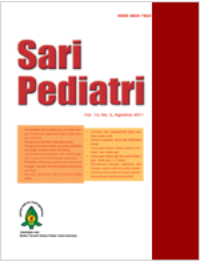Pengaruh Pendapatan Orangtua terhadap Kualitas Hidup Pasien Epilepsi Anak
Sari
Latar belakang. Kualitas hidup seseorang berkaitan dengan kondisi kesehatannya. Anak penderita epilepsi cenderung memiliki kualitas hidup yang buruk. Kualitas hidup rendah pasien epilepsi anak dipengaruhi oleh beragam faktor, salah satunya dari segi demografis keluarga, yaitu besar pendapatan orangtua.
Tujuan. Mengetahui pengaruh pendapatan orangtua terhadap kualitas hidup pasien epilepsi anak di RSUD Dr. Moewardi Surakarta, menggunakan instrumen PedsQL.
Metode. Penelitian ini merupakan penelitian observasional analitik dengan pendekatan potong lintang. Pengambilan sampel dilakukan di poli saraf anak Wijaya Kusuma RSUD Dr. Moewardi, melibatkan wawancara pada 50 pasien epilepsi anak beserta orangtuanya.
Hasil. Pasien epilepsi anak sebagian besar (66.0%) memiliki kualitas hidup yang rendah. Pendapatan orangtua dinyatakan tidak signifikan memengaruhi kualitas hidup pasien epilepsi anak (p=0,281). Kualitas hidup pasien dipengaruhi oleh jenis pemberian OAE dan kepesertaan BPJS (p=0,001; p=0,040).
Kesimpulan. Tidak terdapat pengaruh dari pendapatan orangtua terhadap kualitas hidup pasien epilepsi anak.
Kata Kunci
Teks Lengkap:
PDFReferensi
Haneef Z, Grant ML, Valencia I, dkk. Correlation between child and parental perceptions of health-related quality of life in epilepsy using the PedsQL.v4.0 measurement model. Epileptic Disord 2010;12:275-82.
Gholami A, Salarilak S, Lotfabadi P, dkk. Quality of life in epileptic patients compared with healthy people. MJIRI 2015;29:388-94.
Ronen GM, Streiner DL, Verhey LH, dkk. Disease characteristics and psychosocial factors: Explaining the expression of quality of life in childhood epilepsy. Epilepsy Behav 2010;18:88-93.
Wishwadewa WN, Mangunatmadja I, Said M, Firmansyah A, Soedjatmiko S, Tridjaja B. Kualitas hidup anak epilepsi dan faktor–faktor yang memengaruhi di departemen Ilmu Kesehatan Anak FKUI/ RSCM Jakarta. Sari Pediatri 2016;10:272-9.
Jacoby A, Baker GA. Quality-of-life trajectories in epilepsy: A review of the literature. Epilepsy Behav 2008;12:557-71.
Ashjazadeh N, Yadollahikhales G, Ayoobzadehshirazi A, Sadraii N, Hadi N. Comparison of the health-related quality of life between epileptic patients with partial and generalized seizure. Iran J Neurol 2014;13:94-100.
Blond BN, Detyniecki K, Hirsch LJ. Assessment of treatment side effects and quality of life in people with epilepsy. Neurol Clin 2016; 34:395-410.
Fong CY, Chang WM, Kong AN, Rithauddin AM, Khoo TB, Ong LC. Quality of life in Malaysian children with epilepsy. Epilepsy Behav 2018;80:15-20.
Canuet L, Ishii R, Iwase M, dkk. Factors associated with impaired quality of life in younger and older adults with epilepsy. Epilepsy Res 2009;83:58–65..
Elsharkawy AE, Thorbecke R, Ebner A, May TW. Determinants of quality of life in patients with refractory focal epilepsy who were not eligible for surgery or who rejected surgery. Epilepsy Behav 2012;24:249–55.
Hamid H, Blackmon K, Cong X, dkk. Mood, anxiety, and incomplete seizure control affect quality of life after epilepsy surgery. Neurology 2014;82:887–94.
Luoni C, Bisulli F, Canevini MP, dkk. Determinants of health-related quality of life in pharmacoresistant epilepsy: Results from a large multicenter study of consecutively enrolled patients using validated quantitative assessments: Quality of Life in Pharmacoresistant Epilepsy. Epilepsia 2011;52:2181–91.
Mezgebe M, Akhtar-Danesh GG, Streiner DL, Fayed N, Rosenbaum PL, Ronen GM. Quality of life in children with epilepsy: How does it compare with the quality of life in typical children and children with cerebral palsy? Epilepsy Behav 2015;52:239-43.
Aji DN, Silman C, Aryudi C, dkk. Faktor-faktor yang berhubungan dengan kualitas hidup pasien thalassemia mayor di pusat thalassemia departemen Ilmu Kesehatan Anak RSCM. Sari Pediatri 2016;11:85-89.
Moreira H, Carona C, Silva N, Frontini R, Bullinger M, Canavarro MC. Psychological and quality of life outcomes in pediatric populations:a parent-child perspective. J Pediatr 2013;163:1471-8
Auriel E, Landov H, Blatt I, dkk. Quality of life in seizure-free patients with epilepsy on monotheraphy. Epilepsy Behav 2009;14:130-3.
Dakwa FE, Mudyahoto T. Impact of epilepsy on children’s academic performance. IJARPED 2013;2:359-65.
Suwarba IGNM. Insidens dan karakteristik klinis epilepsi pada anak. Sari Pediatri 2011;13:123-8.
Piperidou C, Karlovasitou A, Triantafyllou N, dkk. Association of demographic, clinical and treatment variables with quality of life of patients with epilepsy in Greece. Quality of Life Research 2008;17:987-96.
Dash D, Aggarwal V, Joshi R, Padma MV, Tripathi M. Effect of reduction of antiepileptic drugs in patients with drug- refractory epilepsy. Seizure 2015;27:25-9.
Mustarsid, Nur FT, Setiawat SR, Salimo H. Pengaruh obat anti epilepsi terhadap daya ingat pada epilepsi anak. Sari Pediatri 2011;12:302-6.
Dang LT, Silverstein FS. Drug treatment of seizures and epilepsy in newborns and children. Pediatr. Clin. North Am 2017;64:1291-308.
Saing JH. Tingkat pengetahuan, perilaku, dan kepatuhan berobat orangtua dari pasien epilepsi anak di Medan. Sari Pediatri 2010;12:103-7.
DOI: http://dx.doi.org/10.14238/sp22.4.2020.230-5
Refbacks
- Saat ini tidak ada refbacks.
##submission.copyrightStatement##
##submission.license.cc.by-nc-sa4.footer##
Email: editorial [at] saripediatri.org


Sari Pediatri diterbitkan oleh Badan Penerbit Ikatan Dokter Anak Indonesia
Ciptaan disebarluaskan di bawah Lisensi Creative Commons Atribusi-NonKomersial-BerbagiSerupa 4.0 Internasional.




